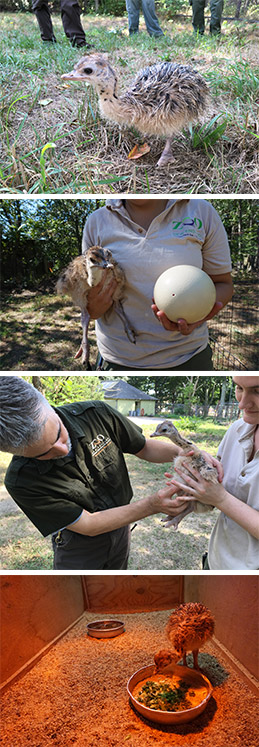Franklin Park Zoo celebrates ostrich hatch
Wednesday September 28, 2016
 Daily walks, three feedings a day and attentive care are all in a day’s work for the zookeepers who are raising an ostrich chick at Franklin Park Zoo.
Daily walks, three feedings a day and attentive care are all in a day’s work for the zookeepers who are raising an ostrich chick at Franklin Park Zoo.
The chick, hatched on September 3, weighed about 2 pounds at birth and measured about 8 inches high. By the time it is six months old, it is expected to weigh around 150 pounds and stand 6 feet tall. The hatch is a first for Franklin Park Zoo, which has exhibited ostriches since 1990.
Franklin Park Zoo is home to two ostriches – an adult male and female. As the pair has been unsuccessful reproducing, it was decided to bring in an egg from another zoo accredited by the Association of Zoos and Aquariums, incubate it and hand raise the chick once it hatched. It is expected that the chick, a male, will be introduced to the adults when it is five to six months old. In the wild, ostriches live in flocks that can number 100 birds.
Raising a chick requires a lot of attentive care. Daily walks are important as it encourages proper bone development. Diet, consisting of grain, greens and chopped egg, is carefully monitored so that the chick does not gain weight too rapidly, which also ensures strong, straight leg development.
“We are incredibly excited about this hatch. The chick is thriving and the staff has done an excellent job of raising this little ostrich. We are looking forward to the day when it is introduced to our other ostriches and makes it exhibit debut on Serengeti Crossing,” said Frederick Beall, Zoo New England General Curator.
Zoo New England has supported the Sahara Conservation Fund’s work in Niger to protect the North African ostrich, which has disappeared from the wild in this West African state. The Sahara Conservation Fund’s work includes a captive breeding program, plans to reintroduce the ostrich into secure protected areas, and an “Adopt-an-Ostrich” program.
Ostriches, which are native to the grasslands of East Africa, South Africa, and in the Sahara and Sahel area, are flightless birds built for running. They use their wings for balance as they run. Their long powerful legs, flexible knees, and two-toed feet help them outrun predators, maintain speed over long distances, and increase agility. Their legs can deliver powerful kicks in self-defense, and each of their toes has a long, sharp claw. They can reach speeds of 45 miles per hour, making them the world’s fastest two-legged animal.
Males are black with white primary flight feathers and tail. Females are gray-brown and white. At nearly two inches across, ostrich eyes are the largest of any land animal. Their eyes are almost on the side of their heads, giving them a 350-degree view of their environment.
Please note: The ostrich chick is currently not on public view.
Related:
- Learn more about ostriches
- Past Quarters for Conservation Projects: Sahara Conservation Fund

